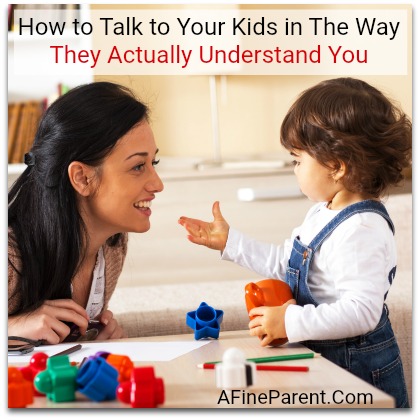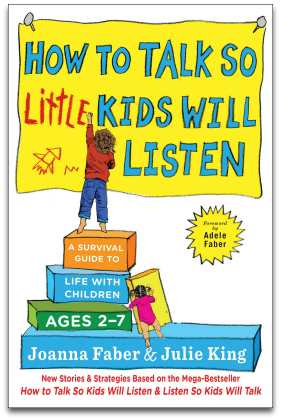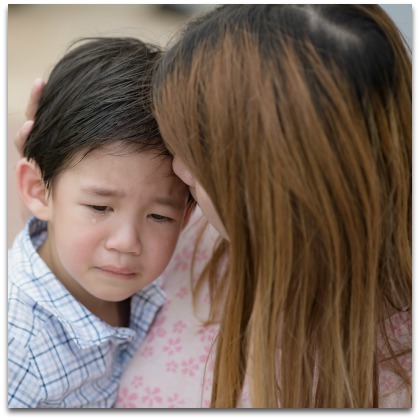 I was three years old the first time that I was sent to my room as a punishment.
I was three years old the first time that I was sent to my room as a punishment.
I knew that I was in trouble and that I wasn’t supposed to be playing with my toys. Instead, I thought I should probably sit quietly and look at a book. My book of choice was Bambi and I distinctly recall thinking I was doing a good thing by patiently awaiting my mother’s return.
When she did, she scolded me because I had been sent to my room as punishment, not to play.
I will never forget the confusion I felt in that moment because I thought I had been doing something good by choosing a quiet activity over a toy.
The problem was, my mom had never explained what being “sent to my room” was supposed to entail. She just assumed I understood. But how can a three-year-old who has never been sent to her room before be expected to know what to do?
Communication is key in every relationship. That includes the relationship between parents and their children. Unfortunately, it seems this element is often overlooked.
 Today’s parents were yesterday’s children, the most likely recipients of such parenting gems as “because I said so” or “it doesn’t matter why, just do as you’re told.” Our parents were notorious for handing out marching orders with no explanations. Of course, they were the victims of the “children should be seen and not heard” generation, so it’s no wonder they struggled with the art of communication.
Today’s parents were yesterday’s children, the most likely recipients of such parenting gems as “because I said so” or “it doesn’t matter why, just do as you’re told.” Our parents were notorious for handing out marching orders with no explanations. Of course, they were the victims of the “children should be seen and not heard” generation, so it’s no wonder they struggled with the art of communication.
Talking to your kids constructively can only have positive results. According to the book, How to Talk so Little Kids Will Listen: A Survival Guide to Life with Children Ages 2-7, respecting a child’s voice as you would want them to respect yours can do wonders for the parent-child relationship.
Here are five key elements essential while communicating with your kids so they actually understand you –
1. It’s never too early to open up the lines of positive communication!
Our daughter is mischief, plain and simple.
She was never one of those toddlers that heard “no” and immediately stopped whatever she was doing. She was the one that continued to poke the bear, so to speak, over and over until I began to wonder if we even spoke the same language.
Forever haunted by the “Bambi” incident, I began communicating with my daughter about her discipline when she was still under a year old. After scolding her, I would sit her down, look her in the eyes, and give her a very detailed explanation as to what she had done wrong, why it was wrong, and how to do it differently next time.
There were multiple times when I wondered if I was crazy to expect a one-year-old to have the faintest idea of what I was saying, especially since she continually committed the same infractions. After months of diligently practicing this form of communication, I finally saw the fruits of my labor. She stopped herself from doing something naughty all on her own and looked pointedly at me as if to say, “See? I listened.”
Now she is three and has a whole gang of imaginary friends that she chats with, usually at night when she is supposed to be sleeping. Imagine my surprise when I overheard her as she lectured one of her invisible friends on the topic of dishonesty.
“Minnie, it is not ok to say you have to go poo just to get out of bed. You only say you have to go poo when you really do and then that’s ok.”
That is the moment when I realized our kid not only listens to us, she retains & understands every single word. Does that mean she always does as she is told? Yeah, right. She’s three. We had two poo fake-outs just last night. But at least she gets it… sort of.
2. Place importance on what your children have to say
 Do your kids just prattle on endlessly about nonsensical things to get your attention? Mine does. If anyone has mastered the longwinded conversation that inevitably goes nowhere, it’s my daughter.
Do your kids just prattle on endlessly about nonsensical things to get your attention? Mine does. If anyone has mastered the longwinded conversation that inevitably goes nowhere, it’s my daughter.
As parents, it can take a lot of patience to get through these Shakespearean-length soliloquies, especially when they occur at an inopportune moment – and they always do. Kids are notorious for choosing to take their moment in the spotlight at the absolute worst times.
You know the times I’m talking about. When you wake up in the morning and realize you forgot to pick up more coffee pods from the grocery store and although you put the wet laundry into the dryer the night before, you didn’t actually start it and now you’re stuck taking your kids to school in an old stretched out sweatshirt from high school.
Those mornings when one of your cats left a trail of vomit throughout the house, but of course the little furball did it in the dead of night so you have no idea which cat to scold (or take to the vet, because it is literally everywhere and that can’t be good).
You’re staring at the clock as if to will time to stop so you can squeeze in a quick drive-thru at the local espresso stand before dropping the kids at school.
And that’s when your child, your precious baby, decides to wander out with mismatched socks, one shoe on (the wrong foot) and begins their speech on why pants are overrated in January and skirts are so much cuter. And to illustrate their stance, they are standing there in their bare little legs, naked bum hanging out, and you just want to scream, “Stop talking and put on your dang pants!”
Here’s the rub.
Children are just little people that want to be heard and feel important, the same as anyone else. They want the undivided attention of their parents so they can express their opinions (misguided as they may often be) and share in the camaraderie of conversation.
That was when we had become one of those modern-day families that ate dinner on trays in front of the TV. This was never my intention, but there we were, every night, no conversation, no sharing of the day’s events.
I decided to create a platform for positive conversation where everyone had a chance to be heard. We now eat dinner at the table (almost) every night and we take turns going around and sharing news about our day. One topic per person at a time. Our daughter not only patiently (and quietly) waits for her turn, she is excited when it is her time to speak.
Sometimes she talks about preschool and sometimes she talks nonsense, but in those few minutes, she gets Mama and Daddy’s undivided attention and she loves it. This has worked wonders and also has the added benefit of giving my husband and me a chance to discuss things before we get too tired (or lazy) at the end of the night.
3. Apologize…Parents, This Means YOU!
 As parents, we are always quick to teach our children to say “I’m sorry” about everything they do wrong. We make them apologize to us, to their friends, and even to their pets (“Ginger, I’m sorry I yanked on your tail…again.”).
As parents, we are always quick to teach our children to say “I’m sorry” about everything they do wrong. We make them apologize to us, to their friends, and even to their pets (“Ginger, I’m sorry I yanked on your tail…again.”).
But as parents, we often forget to practice what we preach in the art of apology.
Sure, my daughter drives me crazy with her constant (and strangely well-versed) arguments over Every Little Thing that she doesn’t want to do. And, sure, it’s completely natural that I inevitably lose my cool and raise my voice after calmly trying to explain to her 150 times why sleep is absolutely necessary for every single person to live and she needs to get into bed NOW or else! (Or else, what? Yeah, I don’t know…still hashing out the particulars.)
Here is where things get tricky. It is human nature to get angry and blow your top. However, we are always telling our kids not to “use that tone of voice with me!” To teach your kids how to manage anger, or rather, the aftermath of anger, we have to lead by example.
When I’ve completely lost my S-H-you-know-what with my daughter, I make a conscious effort to sit down with her and tell her I am sorry for yelling at her while I was angry. Then I explain why I was angry and what she did that upset me. This conversation not only serves to soothe a scared little kid whose mommy is mad at them, but also helps them to understand that everyone makes mistakes and they are just as deserving of apologies as grown-ups.
Saying “I’m sorry” to your little one isn’t too difficult once they look up at you with those puppy dog eyes, big crocodile tears streaming down their chubby flushed cheeks.
The one that gets me, literally pains me sometimes, is saying “I’m sorry” to my husband when our daughter has caught us arguing.
I love my husband, he’s amazing, but seriously? Why can he never remember to rinse the dishes before putting them into the sink? The man can remember every dang fish that swims in the Pacific Northwest, but he can’t manage to recall instructions I have given him a zillion times?
So, yeah, I snap at him, any wife would. But then my little girl looks up at me and says, “Mama, don’t be mean to Daddy.” Arggg!
I cannot stress enough how important it is for children to see their parents apologize to each other when they have behaved in a way that the child would not be allowed to.
(But, sheesh…if he would just do things the way I want them done in the first place, this wouldn’t even be an issue!)
4. Forgive and Forgive QUICKLY
 It’s easy to assume that your family knows they are forgiven their transgressions without having to actually tell them so. I mean, you’re family. Unconditional love and all that.
It’s easy to assume that your family knows they are forgiven their transgressions without having to actually tell them so. I mean, you’re family. Unconditional love and all that.
I grew up in a family where you knew Mom forgave you when her week-long freeze-out ended and she started talking to you again (sorry, Mom, but dang!). Though I never doubted my mom’s love, I did often feel like I wasn’t allowed to make mistakes. And let’s face it, mistakes are a part of life, not just for kids, for everyone.
Communication post-transgressions is probably the most important part of being a parent. Also, feeding your kid and keeping them alive, but you know, it’s like right up there on the scale of important stuff.
Telling our daughter that we forgive her for her mistakes even if we’re angry/disappointed/frustrated, etc. turns a negative situation into a positive one and she is obviously comforted by this. In her infinite three-year-old wisdom, she has pieced together that it’s ok if Mama and Daddy are mad at her sometimes, because we always forgive her. And forgiving her quickly keeps her from stewing in her own fears of rejection.
That isn’t to say kids shouldn’t be disciplined for their actions, but letting them know they are forgiven in a timely manner keeps them from stressing out about your inevitable plot to ship them off to the mythical Orphanage for Naughty Children.
Forgiveness is very powerful because it has the ability to completely rejuvenate someone’s self-worth when it is given, or strip it away and leave them vulnerable if it is not. It also may give the child the confidence and security they need to feel comfortable approaching their parents with important issues, which will be especially essential during the teenage years.
Now, I have a rule with my daughter that we are going to be each other’s bestest girls forever. FOR-EV-ER. To ensure that happens, I am laying the foundation now and that means forgiving her for writing her name on her new princess castle. She is no longer allowed to use ink pens, but she has a brand-new box of washable crayons and she is forgiven.
So yeah. If I can soothe her with coloring utensils during her teen years, I think I’m set. Right?
5. “I love you!”
It’s simple. Just say it. All the time. Anywhere. For any reason. For no reason even.
I love you.
Kids need to hear it, parents need to hear it, we all need to feel it, and it makes us happier.
I love you.
The 2-Minute Action Plan for Fine Parents
Here are a few quick adjustments that can be made overnight and will immediately begin having a positive effect on your parent-child relationship.
- Practice saying “I love you” before sending your child off to school/daycare and when you tuck them in at night.
- Take pause to listen when your child has something to share, even if the timing is less than convenient.
-
Tell them that you forgive them when they have made a mistake and assure them that you know they are still learning and it is your job to teach them so they can make the right choices.
The Ongoing Action Plan for Fine Parents
Now just because you start practicing some of these key communication tools does not mean that life with your sweet little monsters will be perfection. There will be days where they will test you regardless of your efforts and there will be days where every effective parenting tool you have ever heard will fly out the window into oblivion. But the great thing about communication is that it can be used at any time to turn a wrong into a right.
Implementing one new communication method at a time can be an effective way to not only change your behavior as a parent, but to see the changes reflected in your child.
- Pick one new form of communication to focus on for one week. Make sure both parents are on board so the change is consistent.
- Communicate to your child the change that is taking place. If you’ve decided to focus on apologies, explain to your child that it is going to be a family focus because you all need to practice being sorry.
- Take notes on what works and what doesn’t. Every family is different and you will need to find the angle that works best in your situation.
- BE CONSISTENT! For that one week, do not deviate from the plan. Your child may not respond positively right off the bat, so patience is key. Consistency will give your child a sense of stability in the new method and once they are comfortable, they will respond.
- Don’t be afraid to reward yourselves and your child for any successes. Keep track of every interaction where changed behavior was implemented and chart it or use a point system. Allow the child to chart their own moments of success (“That was a wonderful apology! You get to move a space on your good behavior board!”). Perhaps reaching a certain number of points equals ice cream sundae night for the family or a bottle of wine for Mom & Dad.
Once one tool has been effectively implemented, you can add in another and give it the one week trial until they all become just a natural part of your family’s communication.


I spend a lot of time talking to my daughter who is 3 in a couple of days. Almost everyone I know tells me I explain and discuss things with her far too much as she is so young, but she is also very very clever. I swear sometimes we can be having a conversation and I forget she’s only 3 because she’s responding like a 7 or 8 year old!
I feel so much better after reading your article because I feel like she really is getting something out of our discussions. Thanks.
Hi,
I’m from Indonesia. I love read your article.
I’m quite interesting with the imaginary story of your child.
“Minnie, it is not ok to say you have to go poo just to get out of bed. You only say you have to go poo when you really do and then that’s ok.”
Maybe its OOT, but i wonder that how can you tell that your child didn’t lie when she said something before the bed time. Because my child always do the same like wants to pee, wants to poop, wants to eat, etc. And I always agree even though i know that she was lied. But i just don’t want to make her feel that i’m not trust her.
Do you have any idea?
Creating simple rules and sticking to them helps with this, Rara.
In our house the rules are “no coming downstairs after bath” (she takes bath just before going to bed) and “no talking after prayer”.
The first few weeks I had a checklist that I ran through every single night after her bath before she went to her room –
– Have you finished pee-pee and poo-poo?
– Do you want water?
– Do you have your stuffed toy?
[etc.]
Then we read a story and said the prayer. Just before prayer I would remind her “Remember, after prayer we sleep. No more talking”. If she spoke, I would either ignore it (while still cuddling her or patting her to sleep) or gently say just once “Hold on to that thought and we’ll discuss it at breakfast tomorrow” and then go silent. Sometimes she babbled on by herself… sometimes she went to sleep right away, but I didn’t engage in a conversation with her any longer.
That was years ago. And it has stuck. She is 9 now and except on very rare occasions, she just goes to bed right after bath, and does not speak after her prayer.
Staying consistent with rules does not mean we break trust, and conversely, to keep the trust we don’t have to become permissive… we do need to plan ahead though and be intentional (and I acknowledge that can be exhausting, and hence the stress on making it a “habit” so they do it themselves after our initial support)
Hello, Rara!
Sumitha is exactly right in regards to creating rules and sticking to them. We have done the same with our little one. She knows that she is supposed to go to the bathroom before getting tucked into bed. The reason I knew she was tricking me was because it became an every night routine. She would wait until she had been tucked in, lights out, then claim she had to go to the bathroom. It turned out to be just an excuse to get back out of bed.
This is a tough scenario, because you don’t want to deny a little kid the basic human right of using the restroom, especially if they have only recently been potty-trained. They need to feel that it is ok to go to the bathroom at any time. This prevents middle of the night bedwetting and such.
Here is how my husband & I dealt with this specific issue:
We never denied her the right to get up and go to the bathroom.
HOWEVER – if she lied about it, there were consequences.
We have implemented a ticket system aimed toward ‘good behavior.’ One of the rules on her ‘good behavior’ chart is going to bed without incident. SO, if she lied about her need to use the bathroom, she did not earn her Good Bedtime tickets the next morning. If she was honest about her bathroom needs (even if it was after bedtime), she would lose only one of her Good Bedtime tickets for not going before bed. If she went before bed, she received all her Good Bedtime tickets.
These tickets eventually lead to a reward, such as a family trip to the local frozen yogurt shop.
It took a little while, but it worked! Consistency is always key!!
Good luck & thanks for reading!
Quite educative, l’ve learnt a couple of things even though my children are between the ages of 15 and 21. Thanks.
Thank you for your comment, Olayemi! I think these rules can apply to children of all ages. Having positive communication is especially important during the teen years.